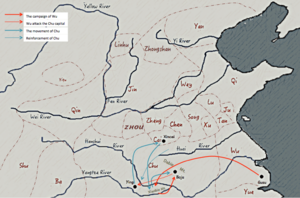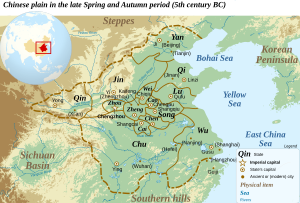Battle of Boju facts for kids
Quick facts for kids Battle of Boju |
|||||||
|---|---|---|---|---|---|---|---|
| Part of Wu-Chu War | |||||||
 Battle of Boju |
|||||||
|
|||||||
| Belligerents | |||||||
| Wu Cai Tang |
Chu | ||||||
| Commanders and leaders | |||||||
| King Helü Fugai Wu Zixu Sun Tzu |
Nang Wa Shen Yin Shu |
||||||
| Strength | |||||||
| 30,000–33,000 | 200,000–300,000 | ||||||
| Casualties and losses | |||||||
| Unknown (relatively minor) | Almost entire army killed or captured | ||||||
The Battle of Boju (Chinese: 柏舉之戰) was a very important battle. It happened in 506 BC in ancient China. This battle was part of a big war between two powerful kingdoms: Wu and Chu. This was during a time called the Spring and Autumn period.
The Wu army was led by their ruler, King Helü. His brother, Fugai, and a wise advisor named Wu Zixu also helped lead. Some stories say Sun Tzu, who wrote The Art of War, was also a main commander. But older historical books don't mention him. The Chu army was led by their prime minister, Nang Wa, and their chief military commander, Shen Yin Shu.
The Wu army won a great victory. They captured and destroyed the capital city of Chu, called Ying. This battle changed a lot in ancient China.
How the War Started
Wu was a smaller kingdom located east of Chu. Chu was a very strong kingdom during the Spring and Autumn period. Chu often fought against another major power, the state of Jin.
To stop Chu from growing too powerful, Jin made friends with Wu. Jin even helped train the Wu army. They taught Wu soldiers how to use war chariots. Over time, Wu became much stronger. In 584 BC, Wu defeated Chu for the first time. They even took over a Chu city called Zhoulai. For the next 70 years, Wu and Chu fought many wars. Wu won most of these battles.
A corrupt official named Fei Wuji caused big problems in Chu. He tricked King Ping of Chu into doing bad things. Because of this, Prince Jian was sent away. His advisor, Wu She, and Wu She's son, Wu Shang, were killed. But Wu She's other son, Wu Zixu, managed to escape. He fled to the state of Wu. Wu Zixu swore he would get revenge for his family. Later, Fei Wuji was punished and executed by Nang Wa and Shen Yin Shu.
In Wu, Wu Zixu became a trusted helper to Prince Guang. He helped Prince Guang become the new king. Prince Guang then became known as King Helü of Wu.
The Wu-Chu War Begins
A very old Chinese history book, Zuo Zhuan, tells us a lot about this war. It was written a long time ago, around the 4th century BC.
In 506 BC, King Helü of Wu decided it was time to invade Chu. He led his army himself. His younger brother, Fugai, and his advisor, Wu Zixu, were also with him. Two smaller states, Cai and Tang, joined Wu. Their rulers had been held prisoner by Chu's prime minister, Nang Wa.
The Wu army sailed up the Huai River. Then they left their ships and marched to the east side of the Han River. The Chu army, led by Nang Wa and Shen Yin Shu, gathered on the west side of the Han River. They were across the river from the Wu invaders.
Shen Yin Shu came up with a smart plan. He wanted Nang Wa to stay and defend the Han River with the main army. Meanwhile, Shen would go north to Fangcheng. He would lead the soldiers there to destroy Wu's ships on the Huai River. He would also block the paths the Wu army would use to go home. Then, Nang Wa would cross the Han River. Both Chu forces would attack the Wu army at the same time, from the front and the back. Nang Wa agreed to this plan. Shen left for Fangcheng.
But after Shen left, a historian named Shi Huang talked to Nang Wa. He told Nang Wa that the people of Chu didn't like him, but they loved Shen Yin Shu. Shi Huang said if Nang Wa followed Shen's plan, Shen would get all the glory. Nang Wa changed his mind. He decided to cross the river and attack the Wu army right away.
The two armies fought three battles. These battles happened between Xiaobie and the Dabie Mountains. The Wu forces won all three times. Nang Wa realized he couldn't win. He wanted to run away, but Shi Huang convinced him to stay.
On the 19th day of the 11th month, the armies met at Boju. Fugai, King Helü's brother, asked for permission to attack. He said Nang Wa was cruel and his soldiers didn't want to fight. He believed if they attacked, the Chu soldiers would run away. King Helü said no. But Fugai decided to attack anyway with his own 5,000 men. Just as he thought, the Chu soldiers fled. The Chu army was completely defeated. Shi Huang was killed in the battle. Nang Wa escaped to the state of Zheng.
Fugai chased the Chu army to the Qingfa River. He waited until half of them had crossed. Then he attacked and defeated them again. Later, the Wu army caught up with the Chu soldiers while they were eating. The Chu soldiers ran away again. The Wu troops ate their food. Then they chased them again and defeated them at the Yongshi River. After winning five battles, the Wu army reached Ying. This was the capital city of Chu.
King Zhao of Chu escaped first to Yun, then to the state of Sui. The Wu army captured Ying. Shen Yin Shu had returned by now. He defeated some Wu forces at Yongshi. But he was wounded three times in these battles. He didn't want to be captured alive. So, he told an officer to kill him and take his head home.
What Happened Next
After Ying fell, Shen Baoxu, a Chu official and old friend of Wu Zixu, went to the State of Qin. He begged Qin for help. At first, the Qin ruler, Duke Ai, didn't want to help. But Shen cried for seven days in the palace courtyard. Duke Ai was touched by his loyalty. He agreed to send soldiers to help Chu.
In 505 BC, the Qin and Chu armies worked together. They defeated Wu in several battles. In September, Fugai, King Helü's brother, went back to Wu. He declared himself the new king. King Helü had to return to Wu. He defeated Fugai, who then ran away and found safety in Chu. King Zhao of Chu then returned to his capital, Ying.
Lasting Impact
Historians see the Battle of Boju as the first very large war of the Eastern Zhou dynasty. Chu was one of the strongest states in the Spring and Autumn period. But after this war, it never got back its old power. Wu reached its strongest point. However, Wu couldn't keep the land it had gained. Its power didn't last long. Only about 30 years later, in 473 BC, the kingdom of Wu itself was conquered. It was taken over by the rising power of Yue to its south.
Many people say the famous Chinese general Sun Tzu was key to this battle. In his book, The Art of War, it says Sun Tzu led the Wu forces. But there are no other records that show he was there. The Zuozhuan, which is the main historical source for this battle, doesn't mention Sun Tzu at all.
 | Selma Burke |
 | Pauline Powell Burns |
 | Frederick J. Brown |
 | Robert Blackburn |


